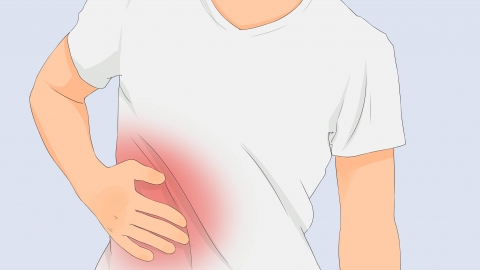What causes a side stitch pain?
Side stitches may be caused by inadequate warm-up before exercise, poor posture, pleurisy, intercostal neuralgia, cholecystitis, and other conditions. Symptoms can be improved through adjusting breathing, correcting posture, resting, and medication. If the pain persists or is accompanied by chest tightness or fever, prompt medical attention is necessary.

1. Inadequate preparation before exercise: Failure to warm up properly before physical activity can cause the body to abruptly enter a state of intense exertion, leading to disordered breathing rhythm and diaphragm spasms. This results in brief, sharp pain below or on the side of the chest, which becomes particularly noticeable during exercise. It is recommended to perform a 5–10 minute warm-up before exercising—such as brisk walking or stretching—and to maintain steady breathing during activity, avoiding rapid or shallow breaths. If pain occurs, stop exercising temporarily and practice slow, deep breathing to relieve symptoms.
2. Poor posture: Prolonged bending, sitting, or desk work can lead to tension in the chest muscles and impaired local blood circulation, causing dull pain in the chest or side waist area. Pain may worsen when changing positions. It is advised to stand up and move regularly, perform chest-expanding and torso-twisting exercises to relax muscles, and maintain an upright sitting and standing posture with chest out and head up in daily life, avoiding prolonged maintenance of the same posture.
3. Pleurisy: Inflammation of the pleura caused by viral or bacterial infection leads to chest pain that typically worsens with breathing or coughing, possibly accompanied by fever, cough, and chest tightness. Under medical guidance, patients may take medications such as cefixime dispersible tablets, ribavirin granules, or ibuprofen sustained-release capsules to alleviate symptoms.
4. Intercostal neuralgia: Inflammation of the intercostal nerves triggered by viral infection, trauma, or other factors causes sharp or burning pain along the rib spaces, which intensifies during twisting movements or deep breathing. It may also be associated with abnormal skin sensations in the affected area. Under medical supervision, medications such as acyclovir tablets, vitamin B1 tablets, and diclofenac sodium sustained-release tablets may be used to relieve discomfort.
5. Cholecystitis: Inflammation of the gallbladder due to bile duct obstruction or bacterial infection can cause pain radiating to the right chest or shoulder, presenting as persistent dull ache or colicky pain, often accompanied by nausea, vomiting, and bloating. Medications such as anti-inflammatory and bile-promoting tablets, cefuroxime axetil capsules, and raceanisodamine tablets may be taken under medical advice to improve symptoms.
Daily care should include maintaining regular作息 (sleep-wake cycles), avoiding excessive fatigue; gradually increasing exercise intensity while paying attention to coordinated breathing; eating a light diet and reducing intake of spicy and greasy foods to support overall health.




